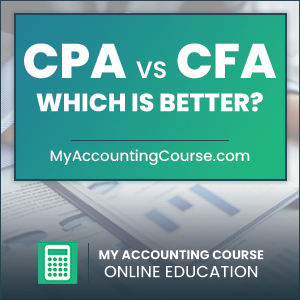 What is the difference between CPA vs CFA? Both accounting certifications have educational requirements, work experience qualifications, and multiple-part exams. Needless to say, both of these financial credentials will help you get promoted, increase your salary, and open the door to different career paths.
What is the difference between CPA vs CFA? Both accounting certifications have educational requirements, work experience qualifications, and multiple-part exams. Needless to say, both of these financial credentials will help you get promoted, increase your salary, and open the door to different career paths.
Let’s take a look at some of the career benefits for both certifications and why a finance professional would choose the CPA (Certified Public Accountant) or CFA (Chartered Financial Analyst) certification. We’ll look at the major differences between the CPA and CFA in this article to figure out which one is right for you and your career.
What is a CPA?
Contents
A CPA or Certified Public Accountant is a professional with a broad scope of practices; they can be found working for the government, in private industry, non-profits and less-commonly as solo practitioners. They can also perform services such as tax preparation for individuals or out-sourced bookkeeping duties for small companies.
How to Become a CPA
To become a CPA, you must possess a minimum of 150 undergraduate hours (bachelor’s degree equivalency.) Some states require candidates to also have a minimum number of years of work experience under the direct supervision of a CPA. The CPA examination is administered by the American Institute of CPAs. The exam consists of four parts. Once a person receives their CPA credential they must then determine what additional requirements (e.g. CPE hours) may be needed for licensure within their state.
What is a CFA?
A CFA or Chartered Financial Analyst is a high level expert in investment management. CFAs can work in tandem with CPAs to provide a more micro analysis of how a corporation – or individual – should manage their assets based on the CPAs findings. Some of the hats worn by CFAs include portfolio manager, research analyst and risk manager.
How to Become a CFA
To become a CFA, you must enroll in the CFA Program offered by the CFA Institute. This is a self-study program that one can participate in while they are working in the profession. To enroll in the program, a person must have a four-year degree or combination of education/work experience and pass a three-part exam. In addition, to receive the charter, one must have accrued four years’ work experience in the field of investment management (which can take place while enrolled in the program) and become a member of the CFA Institute.
CFA vs CPA Education Requirements and Time Frame Difference
Both designations require a minimum of a four-year degree (or equivalent for the CFA) as well as work experience (as determined on the state level for the CPA) and passing a comprehensive examination. It takes roughly four years to pass all three levels of the CFA exam and become chartered.
The timeframe is not as clear-cut for the CPA designation because few candidates pass all four sections of the CPA exam on their first try. They have 18 months to pass all four sections. If all are not passed in that time window, the first passed exam is forfeited and the candidate has to retake it. Believe me. This is not fun.
Cost of Becoming a CFA or CPA
Costs for sitting for the CPA exam vary by state and fluctuate widely. For example, the fees are $1,000 in Minnesota and $50 in Florida. The average cost to sit for the CPA exam is somewhere around $800.
Fees for the CFA exams include a one-time program enrollment fee of $450 and the cost of each exam averages $930 (with significant early- and late-registrations discounts and penalties.)
Obviously, neither of these figures includes CPA review course or CFA review course fees to help study for the tests.
Expected Salaries for a CFA versus CPA
Salaries for both professions are contingent upon type of job, years of experience and geographic location. The average annual salary for a CPA is $62,123 and the median annual salary for a CFA is $63,900.
Best Career Option: CPA versus CFA
Which credential is best-suited for an individual is based on their interests. CPAs have a wider variety of areas in which they can practice (e.g. tax, auditing) whereas CFAs are primarily focused on investment performance. Many sub-categories of specialization allow CPAs and CFAs to fine-tune the direction of their career path. Neither one of these credentials are better than the other. It comes down a matter of personal preference.
Decide what your interests are and what you want to do with your life. Then pick which one is right for you. Here’s some more resources for both exams.


